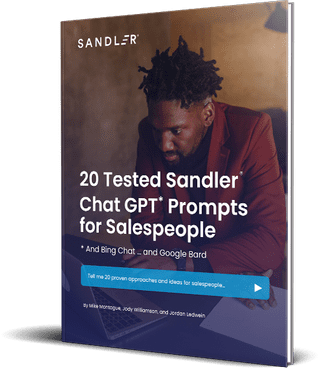
Do you instantly agree when a prospect asks you to set up a detailed presentation and deliver it?
Lots of salespeople do. Sometimes because they’re excited about the possibility of engaging directly with a person or group they haven’t previously been able to meet: Their contact has assured them that So-and-So will be in attendance. Sometimes it’s because they’ve convinced themselves that any sign of interest from a prospect is good and should be quickly rewarded. And sometimes it’s just because they love being on stage and the center of attention!
But in reality, none of these justifications, on their own, are strategically sound reasons for a salesperson to agree to set up a formal presentation and deliver it.
Here’s why. Prospective buyers often go into what we might call “automatic pilot” mode when we deliver a presentation. They nod and smile and wait for us to finish talking. Then . . . once we’ve finished . . . nothing happens. No commitment. No sale. No feedback. No nothing. Just “Thanks, let us think about it.”
Surely, we’ve all noticed this pattern. Is it really the outcome we’re looking for?
If our agreement to deliver a presentation predictably results in “Let us think about it,” in the illusion of forward motion, it’s a waste of precious time, even if it does put us in front of new people.
If the prospect’s supposed “interest” does not correlate with any commitment, it’s meaningless.
And think about it: Is center stage really where we want to be in this situation? Is delivering a long monologue about our product or service really in our best interests? Wouldn’t we prefer to get people engaged in the presentation as active participants in an ongoing conversation . . . as opposed to passive members of the audience leaning back and taking it all in?
If you stop and think for a moment, you’ll realize that even making them part of the conversation is not enough, though it’s a good goal. We want everyone to be crystal clear about what the purpose of this conversation is – and what the path forward looks like! We want to do two important things as sales professionals to provide that clarity.
First, we want to withhold the presentation until we are certain the opportunity has been qualified. What does that mean? It means we’ve confirmed a problem we can solve, a budget available to solve it, and a decision-making process that makes sense to both sides.
And second, we want to be sure to ask a special kind of question. We call this question the Ultimate Up-Front Contract.
Well, before we deliver that proposal, we want to say something like this:
“You know, Jane, I feel like we’re close. . . and I do appreciate you asking me to put together a formal proposal. But can I ask you something? If I come back Tuesday afternoon with a full presentation, as you suggest, and if I can solve the problems we’ve identified, within the budget that we talked about and on the timeline that you’re asking for, meeting all the criteria that you’ve set out, are you going to be comfortable giving me a yes or no answer?”
Once we have posed that question, we want to stop talking. We don’t want to make any excuses or apologies for wanting a yes or no answer in return for delivering that proposal. We ask for clarity. . . and then we wait to see whether we’ll get it. We aim to confirm that everything is all set for the presentation – that the buyer is prepared to make a decision.
This is a peer-to-peer, grownup-to-grownup question that makes the buyer pay attention. Most people who have invested time and energy with you to get the conversation this far will understand that your question deserves a straight answer. They will give you that straight answer and pay attention more closely from that moment forward. And by the way, if you don’t get a straight answer to this question, it’s your job to find out why—and then decide whether it makes sense to prepare and deliver a proposal. It may not.
In a complex sale, you may set up a pre-meeting to preview the proposal in depth with your champion before you deliver it to a larger group. In that case, too, though, you’re looking for clarity. The relevant questions in that situation are: If the proposal makes sense, will you support it? And what happens next if you do?
Ask yourself: If they’re not going to commit to making a decision or telling you what will happen next, why would you prepare a proposal? If you don’t think you will close on that proposal, why would you go to the trouble of delivering it?
FREE REPORT |
|
Learn proven approaches and ideas that connect to the most popular AI applications for salespeople. |


